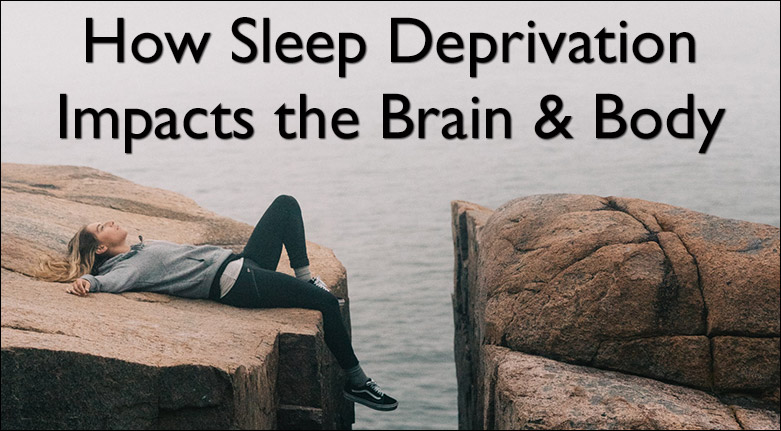Sleep Deprivation is a very real health problem and can lead to so many other issues beyond just feeling cranky and groggy.
Missing out on the recommended amount of sleep and not getting enough good REM cycles each night while sleeping can lead to significant health effects that can become long-term or chronic issues.
With today’s overcrowded lifestyles, and people always “being on” because of connected devices that offer a steady stream of text and email messages, lack of proper sleep has become a common problem for many people, and everyone is susceptible to its negative effects.
Many mental health disorders such as anxiety or depression can make it difficult for people to sleep at night.
To further complicate matters, those with an addiction to alcohol or other substances usually suffer from serious sleep deprivation because the substances make it almost impossible to get proper rest.
Having a few glasses of wine at night may stimulate mental and physical relaxation, but it is known to impede restful sleep. Those who have more than a few drinks each night are impacted even further.
Individuals with a substance addiction experience the greatest amount of sleep loss each night. Certain substances like cocaine, methamphetamine, and other stimulants often wreak havoc on sleep and cause a huge disruption in sleep.
What is Sleep Deprivation?
At its most basic level, sleep deprivation is a condition that occurs when a person does not get enough sleep, either in the short term (acute), or sustained for extended periods of time lasting several months or longer (chronic).
Chronic sleep deprivation is the most dangerous and can cause a variety of symptoms such as daytime fatigue, sluggishness, eating problems, weight gain, mental fogginess, and cognitive issues that affect the brain.
Each person responds differently to being sleep deprived, and some people can be mentally alert on only several hours of sleep each night, although sustaining that over the long run might prove to be difficult or unhealthy.
How Much Sleep is Recommended?
According to the National Sleep Foundation, there are different recommendations of sleep for various ages and groups of people.
- Babies, specifically newborns, sleep the most with an expectation of 14 to 17 hours per day. Infants ranging from 4 to 11 months are expected to sleep 12 to 15 hours each day.
- Toddlers sleep roughly the same amount as infants give or take an hour, while preschoolers sleep 10 to 13 hours every day.
- As children get older and reach school age, sleep requirements decrease yet again to 9 to 11 hours per day.
- Teens need plenty of regular sleep each night, especially since they’re usually experiencing significant growth spurts, but they still don’t need more than around 10 hours of sleep.
- Adults through around 64 years of age tend to not need more than 7 to 9 hours of sleep per day, and older adults need similar amounts but are generally okay at around 7 to 8 hours of sleep every day.
For adults, these numbers are simply recommendations based on the average person and lifestyle.
It’s not unusual for some people function quite well on 6 to 7 hours of sleep nightly, while others require up to 10 hours of sleep in order to feel refreshed in the morning.
How Does Sleep Deprivation Negatively Impact People?
From simple sleepiness during the day to emotional difficulties that affect life in general, sustained sleep deprivation will very likely have a significant negative impact on health and daily routines.
According to a recent article there a few points that need to be considered regarding sleep deprivation.
- Sleep loss affects normal functioning and the ability to focus can be significantly impacted
- Accidents can happen as a result of lack of sleep, and these accidents can include everything from car crashes to incidents at industrial facilities
- The effects of sleep deprivation can have the biggest impact on youth, as they are the ones that feel the effects of sleep deprivation the most over an extended period
- A variety of symptoms of sleep deprivation can be experienced by people as a result of a lack of sleep, and range from mild to severe
What are the Effects and Symptoms of Sleep Deprivation?
The symptoms of sleep deprivation are wide ranging and some are more dangerous than others.
When people suffer from sleep deprivation, the lack of sleep can weaken the immune system, increasing susceptibility to infections. If this happens, a longer recovery time is often expected to return to full health.
Not sleeping enough can also result in significant weight gain due to a hormonal imbalance between the hormones that typically regulate hunger and the feeling of being full.
Proper sleep encourages healing within the vascular walls and when this occurs, blood pressure is naturally regulated. A lack of sleep can result in an increased risk of cardiovascular issues.
Some studies have suggested that a lack of sleep might have some correlation to developing type 2 diabetes, although the studies don’t conclusively point to causation. Still, there is reason for concern.
Fatigue due to lack of sleep can have a profound impact on memory and attention, making it difficult for people to function at high levels at work or school.
A study by the University of California San Diego and the Veterans Affairs Healthcare System used brain imaging technology to show that cognitive impairment from sleep deprivation caused increased activity of the prefontal cortex, meaning this part of the brain was more active than normal to compensate for not having proper sleep.
The brain is highly sensitive to being sleep deprived causing cognitive abilities to be impaired.
Sleep deprivation can cause anxiety and depression, but ironically, depression or anxiety can also cause sleep deprivation.
Other symptoms of sleep deprivation often include:
- Body aches
- Confusion
- Headaches
- Yawning and fatigue
- Trembling hands and feet
- Increased blood pressure
- Stress
- Decreased immunity
- Irritability
- Weight gain or obesity
- Heart disease
- Memory loss
What are the Causes of Sleep Deprivation?
There are many causes of sleep deprivation, and usually they are specific to each individual experiencing the symptoms.
It isn’t unusual for people to intentionally deprive themselves of sleep for a short time with the purpose of pursuing other endeavors such as a big project at work or school midterms and finals.
Netflix binges that keep people from sleeping because of “just one more episode” are prime examples of intentional sleep deprivation. These usually only happen for one or two nights in a row, and the lack of sleep for those few nights often causes them to sleep soundly soon after they finish.
Like Netflix and streaming TV, social media, computers, and cellphones are also a more recent phenomenon from the past ten years that have contributed to Americans not getting enough sleep each night.
Mental health conditions like anxiety or depression can cause people to have trouble falling asleep each night, and medications used to combat these health issues can also make it hard for people to sleep.
Stress from work, school, relationships, or family problems can weigh heavily on the minds of many of us as we lay in bed each night attempting to fall asleep.
As mentioned earlier, drugs and alcohol, especially those with a serious substance use addiction, will often make it nearly impossible to fall asleep at night, or cause a reduction in REM cycles that inhibit restful sleep.
Whatever the cause, when people don’t get the recommended amount of sleep, certain symptoms will follow and can lead to the accumulation of sleep debt.
What is Sleep Debt?
Sleep debt accumulates as people become more and more sleep deprived. As sleep debt increases, it becomes harder to recognize the signs or what it feels like to be rested.
Sleep debt can be partial, meaning a person only gets a few hours of sleep for several nights in a row, or a little longer. Total sleep debt, on the other hand, signifies that a person was sleepless for 24 hours in a row or more.
For either type, even when sleep debt gets so bad that weight gain, heart disease, or memory loss are all on the horizon, it’s still not impossible to repay the debt.
Chronic sleep-deprived individuals can also repay a significant sleep debt, but it might take a bit longer.
7 Ways to Avoid Sleep Deprivation
For those suffering from sleep deprivation, there are ways to avoid, or at least lessen, the probabilities of experiencing a lack of sleep.
Here are 7 common ways to avoid sleep deprivation:
1. Sleep Sanctuary
A sleep sanctuary is a place that is only used for sleeping and resting activities. A proper sleep sanctuary is a room that is dark, quiet, and free from smartphones, tablets or other devices that can be easily picked up and cause distractions.
2. Naps
Naps can be useful but done improperly (napping for too long or too late in the day) can throw a wrench into an existing sleep schedule. While naps can help when there are hours missed, they can also cause an inability to sleep during otherwise normal sleeping hours.
3. Avoiding Caffeine
Caffeine can be a prime culprit for many people. If an individual is caffeine-sensitive, then it’s a good idea to avoid caffeine after a certain time of the day to ensure sleep schedules are not interrupted.
4. Exercise
Having a regular exercise routine at least four or five days a week improves bodily functions in addition to reducing stress and promoting sleep.
5. Meditate
Meditation greatly reduces stress, helps the mind focus, and eases anxiety. Meditating immediately before bedtime is recommended to calm the mind and prepare for sleep.
6. Take a Bath or Shower Before Bed
Taking a warm bath or shower at night right before going to bed relaxes the body physically and helps calm the mind, which sets a person up for sleep.
7. Avoiding Alcohol or Drugs
Some prescription medications can cause sleep difficulties, but they are necessary for coping with health conditions. Avoiding alcohol or recreational drugs will make it easier to get restful sleep at night, although this isn’t possible for those with a dependence or addiction to them.
Substance use addiction is often rooted in other health issues and overcoming this for most people requires additional help from an addiction treatment facility.
Help is available, and regaining control of one’s life and health could be just what’s needed for overcoming sleep deprivation and finally being able to sleep again at night.







